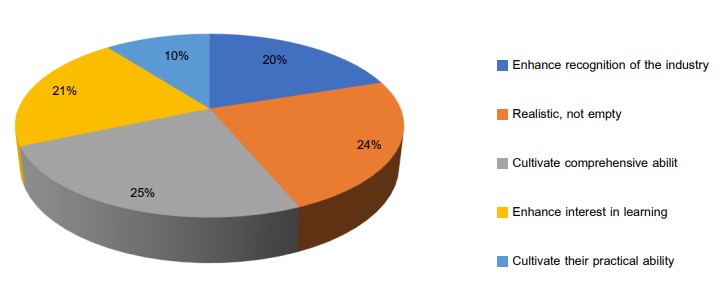Research on the Construction Mode of Talent Supply Chain System in the Logistics Industry of Higher Vocational Colleges
Main Article Content
บทคัดย่อ
The logistics industry is experiencing a constant increase in demand for talents. However, current logistics management programs in colleges and universities are unable to meet the demands of the market due to the low education level and weak learning ability of students in higher vocational colleges. These students tend to have misconceptions about the logistics industry, lack interest in logistics knowledge, and therefore lack practical skills. This paper proposes solutions to these problems. The study employs the concept of integrated education to enhance students' interest in learning logistics by improving their professional cognition through discussion, questionnaire methods, and literature analysis. Additionally, a school-enterprise cooperation model is implemented to improve students' practical skills. The study analyzes the effects of practical teaching on student development and compares the advantages and disadvantages of independent college logistics training bases versus those built in collaboration with enterprises. A win-win cooperation model is proposed, wherein schools and enterprises co-construct training bases led by enterprises and integrate enterprise projects into the teaching process. The study's teaching model combines theory and practice, enabling students to participate in the construction of enterprise projects. The proposed solutions facilitate the fusion of education, co-construction of training sites, and development of the talent supply chain system.
Article Details

อนุญาตภายใต้เงื่อนไข Creative Commons Attribution-NonCommercial-NoDerivatives 4.0 International License.
บทความนี้ได้รับการเผยแพร่ภายใต้สัญญาอนุญาต Creative Commons Attribution-NonCommercial-NoDerivatives 4.0 International (CC BY-NC-ND 4.0) ซึ่งอนุญาตให้ผู้อื่นสามารถแชร์บทความได้โดยให้เครดิตผู้เขียนและห้ามนำไปใช้เพื่อการค้าหรือดัดแปลง หากต้องการใช้งานซ้ำในลักษณะอื่น ๆ หรือการเผยแพร่ซ้ำ จำเป็นต้องได้รับอนุญาตจากวารสารเอกสารอ้างอิง
Brockmann, M., Clarke, L., & Winch, C. (2010). The Apprenticeship Framework in England: A new beginning or a continuing sham? Journal of Education and Work, 23(2), 185-204. DOI: 10.1080/13639081003627439.
Chen, S., Cai, W., & Cui, J. (2019). Durmuş, A., & Dağlı, A. (2017). Integration of vocational schools to industry 4.0 by updating curriculum and programs. International Journal of Multidisciplinary Studies and Innovative Technologies,
(1), 1-3.
Colardyn, D., & Malglaive, G. (1986). The national vocational education plan for unqualified young people (16-18 years old): The French experience (1982-1984). International Review of Education, 32(4), 489-504. DOI: 10.1007/BF00597554.
Cort, P. (2009). The EC Discourse on Vocational Training: How a 'Common Vocational Training Policy' turned into a lifelong learning strategy. Vocations and Learning, 2(2), 149-166. DOI: 10.1007/s12186-008-9019-9.
Deissinger, T., & Hellwig, S. (2005). Apprenticeships in Germany: Modernising the Dual System. Education + Training, 47(4/5), 282-293. DOI: 10.1108/00400910510601896.
Gambin, L., & Hogarth, T. (2017). Employers and apprenticeships in England: Costs, risks and policy reforms. Empirical Research in Vocational Education and Training, 9(1), 1-18. DOI: 10.1186/s40461-017-0060-5.
Gao, Q., Liu, S., & Hu, L. (2020). Lamancusa, J. S., Jorgensen, J. E., & Zayas-Castro, J. L. (1997). The learning factory A new approach to integrating design and manufacturing into the engineering curriculum. Journal of Engineering Education, 86(2), 169-174. https://doi.org/10.1002/j.2168-9830.1997.tb00272.x.
Glover, R. W., & Bilginsoy, C. (2005). Registered apprenticeship training in the US construction industry. Education + Training, 47(4), 252-262. doi: 10.1108/00400910510601913.
He, W., Li, W., & Li, L. (2019). Research on the Construction of "Three Integration and Three Promotion" Applied Talents Cultivate Mode for Automation Major. International Journal of Information and Education Technology, 9(9), 665-669.
He, X. (2019). Zald, M.N. Sociology as a discipline: Quasi-science and quasi-humanities. Am Soc 22, 165–187 (1991). https://doi.org/10.1007/BF02691895.
Hummelsheim, S., & Baur, M. (2014). The German dual system of initial vocational education and training and its potential for transfer to Asia. Prospects, 44(2), 239-254. doi: 10.1007/s11125-014-9311-4.
Jiao, Y. (2018). Logistics professional talents training of application-oriented universities based on production-teaching-research synergetic education. Proceedings of the 2018 International Conference on Social Science and Management Engineering, 24, 86-91. https://doi.org/10.2991/ssme-18.2018.24.
Kuhlee, D. (2015). Federalism and corporatism: On the approaches of policy-making and governance in the dual apprenticeship system in Germany and their functioning today. Research in Comparative and International Education, 10(4), 476-492. doi: 10.1177/1745499915617104.
Li, C., Li, G., & Shi, Y. (2019). Analysis of the construction and implementation of the new mode of school-enterprise cooperation in higher vocational colleges from the perspective of educational reform. Open Journal of Social Sciences, 7(11), 217-224. https://doi.org/10.4236/jss.2019.711017.
Li, Y., Li, L., & Liu, J. (2020). Wang P., Construction and Application of Accounting Computerization Skills Teaching Resource Database under the Background of "Internet +". Curriculum and Teaching Methodology (2019) 2: 1-4.
DOI: http://dx.doi.org/10.23977/curtm.2019.21001.
Liu, L. (2021). Caligiuri, P., Mencin, A., & Jiang, K. (2012). Win-win-win: The influence of company-sponsored volunteerism programs on employees, NGOs, and business units. Personnel Psychology, 65(4), 825-852. https://doi.org/10.1111/peps.12019.
Pilz, M. (2009). Why Abiturienten do an apprenticeship before going to university: The role of 'double qualifications' in Germany. Oxford Review of Education, 35(2), 159-175. DOI: 10.1080/03054980902771072.
Rauner, F., & Wittig, W. (2010). Differences in the Organisation of Apprenticeship in Europe: Findings of a Comparative Evaluation Study. Research in Comparative and International Education, 5(3), 237-255. doi: 10.2304/rcie.2010.5.3.237.
Tao, J., Ni, S., & Ding, T. (2021). Research on collaborative innovation evaluation of intelligent logistics park.
IEEE Transactions on Engineering Management. Advance online publication. https://doi.org/10.1109/TEM.2021.3117756.
Wu, Y., Chen, Y., & Chen, S. (2020). Agarkova, L., Gurnovich, T., Filonich, V., Shmatko, S., & Podkolzina, I. (2016). Priority directions of development of innovation education cluster in the regional agro-industrial complex. International Journal of Economics and Financial Issues, 6(2), 718-727.
Zhu, M., Zhang, J., & Bao, S. (2011). Research on the cultivation of logistics engineering application talents by the diversification school-enterprise cooperation. Procedia Engineering, 15, 4173-4177. https://doi.org/10.1016/j.proeng.2011.08.783


